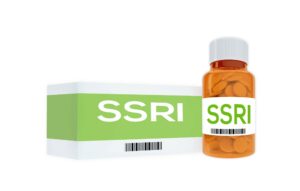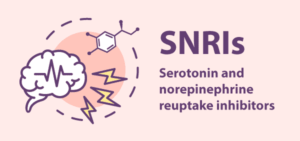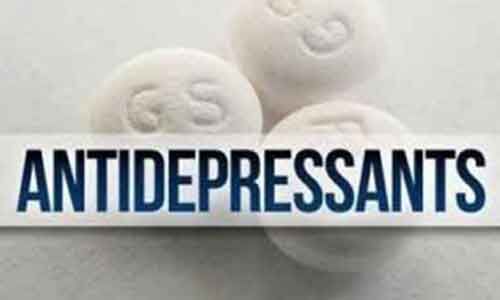Antidepressant Medication is a treatment for depression, but what exactly does it do? The main function of an antidepressant medication is to help relieve symptoms of emotional distress and reduce the risk or severity of relapse. It’s possible for people to get depressed because of many different reasons, such as genetics, life events, trauma, stressors, and other illnesses. In this blog post, we will discuss how antidepressants work in the brain to make you feel good again.
Contents
- 1 What Is Antidepressant?
- 2 Types of Antidepressant Medication
- 3 Risks In Taking Antidepressant Medication
- 4 Antidepressants And Suicide Risk
- 5 Guidelines For Taking Antidepressant Medication
- 6 Withdrawal Symptoms Of Antidepressant Medication
- 7 How To Stop Taking Antidepressant Medication Safely?
- 8 Conclusion
What Is Antidepressant?

Antidepressant is a medication used to treat depression. It works by changing the balance of certain natural chemicals in your brain (neurotransmitters).
It slows down the process in which serotonin is produced by neurons, thus increasing it at neural synapses. This neurotransmitter has an important role in mood regulation and depression symptoms reduction.
Types of Antidepressant Medication

There are several types of antidepressants, which act in different ways. The most common ones include SSRI (selective serotonin reuptake inhibitor), SNRI (serotonin-norepinephrine reuptake inhibitors), and Tricyclics/TCAs (tricyclic antidepressant). All these medications have been shown to be effective in the treatment of depression, but there are some differences between them.
SSRI Medicine

Selective serotonin reuptake inhibitors (SSRIs) are a class of antidepressant drugs. SSRI medications work by increasing the amount of serotonin in the brain. Serotonin is a neurotransmitter that helps to regulate mood.
Some of the most common SSRI medications include citalopram (Celexa), fluoxetine (Prozac), fluvoxamine (Luvox), paroxetine (Paxil), and sertraline (Zoloft).
SSRIs are generally well-tolerated, but they can cause some side effects. Side effects of SSRI antidepressants include nausea, drowsiness, or insomnia. They may also cause sexual side effects such as decreased libido and delayed orgasm.
SSRI medications can be used to treat a variety of mental health conditions in addition to depression, including anxiety disorders and obsessive-compulsive disorder (OCD). Some SSRIs are also approved for the treatment of panic attacks.
However, If someone has bipolar disorder, it is important for them not to take an antidepressant. If they take one, it might make their episodes worse. In some cases, antidepressants might even make psychotic symptoms worse by causing serotonin toxicity when they interact with certain antipsychotic medications.
Side Effects Of SSRI Medicine
The side effects of SSRI medications can vary from person to person. Some common side effects include
- Nausea
- Diarrhea
- Sexual dysfunction
- Weight gain
- suicidal thoughts and behaviors
However, these side effects usually go away within a few weeks after starting the medication. It is important to report any adverse effects to your doctor so that they can be monitored and addressed.
If you experience any changes in mood or behavior while taking an SSRI medication, contact your doctor right away. He or she may need to adjust your dose or switch you to different antidepressant medication.
SNRI Medicine

SNRI stands for serotonin and norepinephrine reuptake inhibitor. It is a type of antidepressant medication that blocks the absorption of these two neurotransmitters in the brain.
This helps to increase their levels and improve their mood. SNRI medications are usually prescribed to people who have depression, anxiety disorders, or other mental health conditions.
Some common brands include Cymbalta, Effexor XR, Pristiq, and Wellbutrin XL.
Side effects of SNRI
- Nausea
- Dizziness
- Fatigue
- Insomnia
- Weight gain or loss
- Sexual dysfunction
- Dry mouth
- Headache
The side effects of SNRI medicine can vary from person to person, and it is important for individuals to talk with their doctor if they believe that the medication they are taking may be causing certain symptoms.
Tricyclics/TCAs Medicine

Tricyclics/TCAs are a type of antidepressant medication. They work by increasing the levels of serotonin and norepinephrine in your brain. This helps to improve your mood and relieve symptoms of depression. TCAs are available as tablets, capsules, or liquid forms.
Some common brand names include Amitriptyline (Elavil), Clomipramine (Anafranil), Desipramine (Norpramin), Doxepin (Sinequan), Imipramine (Tofranil), Nortriptyline (Pamelor).
Side effects of tricyclics/TCAs
- Dry mouth
- Constipation
- Blurred vision
- Drowsiness
- Dizziness
- Confusion
- Weight gain
- Decreased heart rate
Patients should speak to their doctor if they experience any of these side effects. Tricyclics/TCAs are not safe for pregnant women or those who are breastfeeding. Patients with glaucoma, prostate problems, or seizures should avoid these medications. Additionally, patients taking MAO inhibitors should not take tricyclics/TCAs.
Risks In Taking Antidepressant Medication

There are risks in taking antidepressants, some of them are:
- Antidepressant Medication Description: The process of treating depression with antidepressants is called pharmacotherapy, and it usually involves taking one or more medications by mouth on a regular basis.
- This works by changing how certain chemicals in the brain are used (or metabolized). There are several types of antidepressant medications available today that affect these neurotransmitters differently; different patients may respond better to some than others for reasons not fully understood.
- Antidepressants can also increase the risk of suicidal thoughts and behaviors in children, adolescents, and young adults. Anyone who is considering taking antidepressants should discuss all the risks and benefits with their doctor.
- People who are pregnant or breastfeeding should also talk to their doctor before taking antidepressants.
- Some antidepressants can cause problems for the baby. Paxil (paroxetine), for example, can cause heart defects in babies if taken during pregnancy.
- Some people experience withdrawal symptoms when they stop taking antidepressants. These symptoms can include dizziness, headache, nausea, vomiting, diarrhea, anxiety, and insomnia. It is important to taper off the medication under a doctor’s supervision.
- Some people may experience unpleasant side effects, such as nausea, weight gain, or sexual dysfunction.
- Additionally, some antidepressants can be quite addictive and may lead to withdrawal symptoms if discontinued abruptly. Finally, antidepressants can interact with other medications a person takes and can cause serious health problems.
- For these reasons, it is important to consult with a healthcare provider before starting antidepressant therapy.
- If you are considering antidepressant medication treatment for depression, speak with your doctor about the possible risks and benefits involved.
Antidepressants And Suicide Risk

There are a lot of people that take antidepressants every day, but there is a risk for suicide. A person’s risk for suicide may increase when they first start taking antidepressants or when their dose changes.
Some people have a higher risk for suicide if they take antidepressants. This includes young people, people who have just started taking antidepressants, and people with mental health problems.
If you are afraid about your risk for suicide, talk to your doctor or another healthcare professional. They can help you figure out whether the benefits of antidepressant treatment outweigh the risks for you.
Guidelines For Taking Antidepressant Medication

There are guidelines to take antidepressants, some of them are as follows:
- When prescribing antidepressant medication, a doctor will usually start with the lowest effective dose.
- If you have been prescribed an antidepressant for depression, it is important to know when and how much of this medicine to take so that it works properly without causing any unwanted side effects.
- Take the antidepressant exactly as prescribed by your doctor. Do not take more or less than what is recommended.
- If you are having trouble remembering to take your medicine, ask your doctor if it can be taken once a day instead of twice.
- Take antidepressants with food to help lessen stomach upset.
- Do not stop taking the medication without talking to your doctor first. It is important to slowly wean yourself off of antidepressant medication so that you do not experience any unpleasant side effects.
- It is also important to keep in mind that different people may respond differently to antidepressant medications.
- If one type of antidepressant doesn’t work for you, do not stop taking it. Speak with your doctor about the possibility of trying a different type or brand.
Withdrawal Symptoms Of Antidepressant Medication
The withdrawal symptoms of antidepressant medication can be very severe.

- Some people have reported feeling like they were going crazy or having a nervous breakdown.
- Others have said that they felt like they were dying.
- The most common symptoms are flu-like symptoms, such as fever, body aches, and headache.
- Other possible symptoms include dizziness, sweating, nausea, vomiting, diarrhea, tingling sensations, electric shock feelings, and visual disturbances.
- These symptoms can last for weeks or even months after stopping the medication.
- It is important to consult with your doctor before discontinuing any antidepressant medication.
- He or she may be able to help you wean off the medication slowly and minimize the withdrawal effects.
- The withdrawal symptoms of antidepressant medications can be very severe in some people, leading to suicidal thoughts or tendencies.
How To Stop Taking Antidepressant Medication Safely?
Some people who are taking antidepressants may want to stop, but they are afraid of the potential side effects. There are ways to safely stop taking antidepressants without experiencing any major problems.

- The first step is to talk to your doctor about the best way to taper off your medication.
- Your doctor will probably suggest gradually decreasing the dose over a period of several weeks or months.
- It’s important to be patient and take things slowly so that you can avoid any adverse reactions.
- During this time, it’s also important to continue seeing your doctor so that he or she can monitor your progress.
- If you’re feeling anxious or depressed during the withdrawal process, you may need additional support from a therapist or counselor.
- These professionals can help you to cope with the process and deal with any emotional pain or other symptoms.
There are also some things you can do at home to make the process easier.
- Try to keep a positive attitude and focus on your goals.
- Stay busy and active, and avoid isolating yourself from friends and family.
- If possible, try to get regular exercise and eat a healthy diet.
- These simple tips can help make the transition smoother and less stressful.
- Finally, remember that it’s ok to ask for help if you need it. There is no shame in seeking out support during this difficult time.
Conclusion
People often have misconceptions about antidepressants. The truth is that they are not addictive, and people can stop taking them whenever they want to. Many people with depression or anxiety take antidepressants. It is important for patients to know what will help them the most. You could start feeling worse when you try these medicines if they don’t work for you. Most importantly, it’s vital for anyone who may be suicidal to seek professional help as soon as possible because there are treatments available that could save lives.
For more information, please contact MantraCare. Depression is a mental illness characterized by persistent feelings of sadness, hopelessness, and loss of interest in daily activities. If you have any queries regarding Online Depression Counseling experienced therapists at MantraCare can help: Book a trial Depression Therapy session


